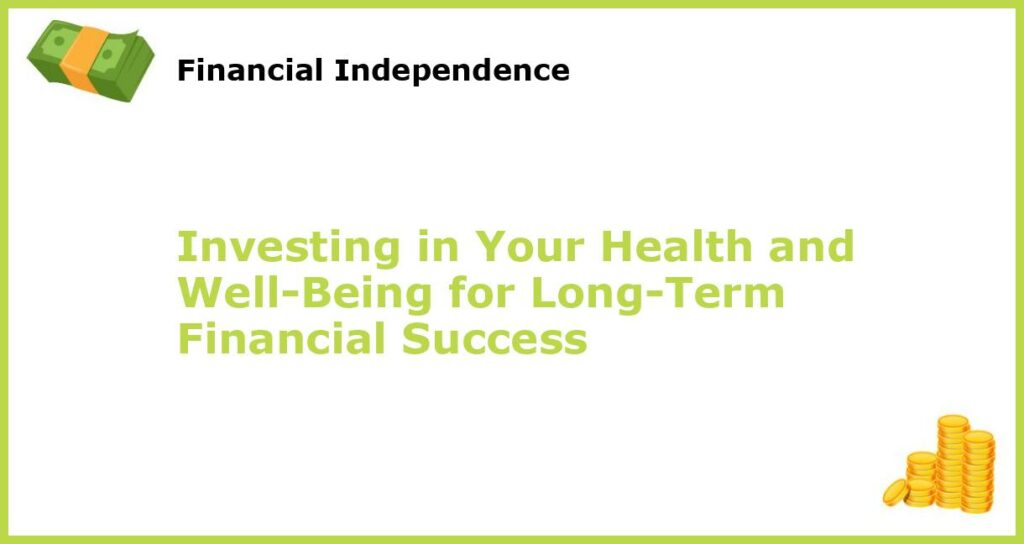Investing in your health and well-being can have a direct impact on your long-term financial success. While it may be tempting to overlook your physical and mental health in the face of the demands of your professional life, it’s important to remember that your health is one of your most valuable assets. Neglecting your health can ultimately result in higher costs and decreased productivity in the long run. Here are some key areas to focus on when it comes to investing in your health and well-being for long-term financial success.
The Cost of Poor Health Habits

Poor health habits such as unhealthy eating, lack of exercise, and insufficient sleep can have a significant impact on your overall well-being. Not getting enough sleep can lead to fatigue, decreased productivity, and poor decision-making, while an unhealthy diet can cause chronic health issues and decreased energy levels. Additionally, neglecting exercise can lead to poor cardiovascular health, weight gain, and decreased productivity. It’s important to remember that your health is closely tied to your ability to perform at your best both personally and professionally. The costs of ignoring these aspects of your well-being can be far greater than you may realize.
The Importance of Sleep

Sleep is one of the most crucial parts of investing in your health and well-being. Your body uses sleep to refresh itself and recharge for the next day, so not getting enough can have a significant negative effect on productivity, creativity, and mental sharpness. Carving out a block of time each day to support your sleep can be an investment in your long-term efficiency and effectiveness.
Eating for Long-Term Health and Wealth

Another key aspect of investing in your health is eating a healthy, nutrient-dense diet. Eating a balanced diet full of whole, nutritious foods can help prevent chronic health issues, give you the energy you need to perform at your best, and keep medical bills at bay. In addition to saving money on medical costs, eating a healthy diet can enhance your creativity, motivation, and clarity of thought.
Exercise and Productivity

Regular exercise not only has physical benefits but also contributes significantly to mental and emotional health. Exercise can improve cardiovascular health, weight management, and immune function, as well as increasing productivity and creativity. Setting aside time each week to exercise can pay dividends in terms of long-term financial success.
Mental Health and Wealth

Managing stress and maintaining good mental health is an essential part of investing in your overall well-being. High levels of stress can cause physical health problems, depression, and anxiety, all of which can lead to decreased productivity and overall success. Working with a mental health professional, practicing meditation or mindfulness, and engaging in enjoyable activities can all help you manage your mental health and increase your ability to perform your best.
Work-Life Balance
Cultivating work-life balance is critical in creating a solid foundation for long-term financial success. Focusing on hobbies and interests outside of work can enhance happiness, fulfillment, and ultimately success in all areas of life. Investing in your well-being outside of work can have a significant positive impact on your professional success.
Building Strong Relationships
Your social connections are also essential to your well-being. Spending time with family and friends can help manage stress and keep you grounded. Additionally, networking and building connections with colleagues can increase your professional success. Investing time in building quality relationships can pay dividends in all areas of your life, including your long-term financial success.
Mindfulness and Meditation
Practicing mindfulness and meditation is another effort you can invest in to enhance your overall well-being. These practices have been shown to reduce stress, improve focus, and increase feelings of happiness and well-being. Even taking just a few minutes each day to focus on your breath and clear your mind can have a profound effect on your mood, productivity, and commitment to your well-being.
Investing in Quality Healthcare
One of the most significant steps you can take when investing in your health and well-being is ensuring you have access to quality healthcare. This means scheduling routine checkups, preventative care, and seeking medical care when needed. Prioritizing your health by investing in quality healthcare can result in catching health issues early and avoiding larger medical bills down the line.
The Power of a Positive Mindset
Cultivating a positive mindset is a vital aspect of investing in your health and well-being. Focusing on small wins, celebrating milestones along the way, and staying motivated are all essential components of believing in the process of investing in yourself. Investing in your health is a journey, so maintaining a positive mindset can help with sustained effort and commitment to your long-term success.







